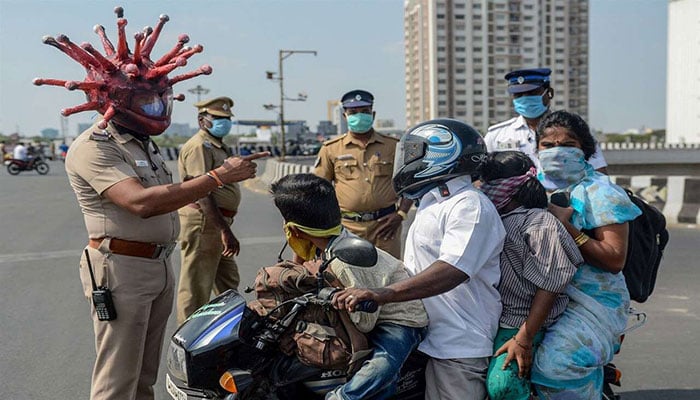Two more Indian states declare lockdown
NEW DELHI: New Covid-19 deaths surged past again in India on Saturday in one of the world's worst outbreaks, two more states declared lockdown.
India now accounts for nearly half of the world’s new known cases according to an AFP database, and it reported 409,300 new cases and more than 4,133 deaths on Saturday. Many experts suspect the official death and case numbers are a gross underestimate.
New Delhi has struggled to contain the outbreak, which has overwhelmed its healthcare system and sparked public anger over mismanagement.
"The government says that there is ample supply of medicines and oxygen," said Brijesh Pandey, who spends hours every day jostling with others to try to secure oxygen for his brother-in-law.
"But look how hundreds of desperate people are struggling to save their brothers, sisters and parents."
The surge has spilled into next-door Bangladesh, Nepal and Sri Lanka.
Two southern states in India became the latest to declare lockdowns.
At over 300,000, Karnataka’s capital of Bengaluru has the highest active caseload of any Indian city. But experts warn the worst is still ahead as India’s third-largest city buckles under oxygen shortages, overrun hospitals and crowded crematoriums. In Tamil Nadu state, the lockdown announcement followed a daily record of more than 26,000 cases on Friday.
Infections have swelled in India since February in a disastrous turn blamed on more contagious variants as well as government decisions to allow massive crowds to gather for religious festivals and political rallies.
India’s surge in coronavirus cases is having a dangerous effect on neighboring Bangladesh. Health experts warn of imminent vaccine shortages just as the country should be stepping up its vaccination drive, and as more contagious virus variants are beginning to be detected.
On Saturday, health authorities said that for the first time, a coronavirus variant originally identified in India was detected in Bangladesh, without providing further details. For weeks, South African variants have dominated the samples sequenced in Bangladesh. There are concerns that these versions spread more easily and that first-generation vaccines could be less effective against them.
Experts say that declining infections in Bangladesh over the last two weeks compared to March and early April — for reasons that aren’t fully understood — provided the perfect opportunity for the nation to scale up vaccinations.
Pope Francis on Saturday expressed his backing for "universal access to the vaccine and the temporary suspension of intellectual property rights", condemning the "virus of individualism" that "makes us indifferent to the suffering of others".
"A variant of this virus is closed nationalism, which prevents, for example, an internationalism of vaccines," he said.
"Another variant is when we put the laws of the market or intellectual property above the laws of love and the health of humanity."
The global arsenal against the coronavirus expanded as the vaccine from China’s Sinopharm became the first fully non-Western shot to get the green light from the World Health Organisation.
The WHO has already given emergency use authorisation to vaccines from Pfizer-BioNTech, Moderna, Johnson & Johnson, and AstraZeneca, a status that paves the way for countries to quickly approve and import shots.
Sinopharm is already in use in 42 territories around the world, including Pakistan, Egypt, the United Arab Emirates and Serbia.
The European Union meanwhile said it had sealed a deal with BioNTech/Pfizer for up to 1.8 billion extra doses of its Covid-19 vaccine.
"Other contracts and other vaccine technologies will follow," EU chief Ursula von der Leyen said.
The United States this week backed a push led by the WHO, India and South Africa to waive Covid-19 vaccine patent protections to boost supply to poorer nations.
The European Union on Saturday pressed the US for a concrete proposal and a commitment to export much-needed jabs.
-
 Cuba-Canada Travel Advisory Raises Concerns As Visitor Numbers Decline
Cuba-Canada Travel Advisory Raises Concerns As Visitor Numbers Decline -
 Anthropic Buys 'Super Bowl' Ads To Slam OpenAI’s ChatGPT Ad Strategy
Anthropic Buys 'Super Bowl' Ads To Slam OpenAI’s ChatGPT Ad Strategy -
 Prevent Cancer With These Simple Lifestyle Changes
Prevent Cancer With These Simple Lifestyle Changes -
 Air Canada Flight Diverted St John's With 368 Passengers After Onboard Incident
Air Canada Flight Diverted St John's With 368 Passengers After Onboard Incident -
 Experts Reveal Keto Diet As Key To Treating Depression
Experts Reveal Keto Diet As Key To Treating Depression -
 Inter Miami Vs Barcelona SC Recap As Messi Shines With Goal And Assist
Inter Miami Vs Barcelona SC Recap As Messi Shines With Goal And Assist -
 David Beckham Pays Tribute To Estranged Son Brooklyn Amid Ongoing Family Rift
David Beckham Pays Tribute To Estranged Son Brooklyn Amid Ongoing Family Rift -
 Jailton Almeida Speaks Out After UFC Controversy And Short Notice Fight Booking
Jailton Almeida Speaks Out After UFC Controversy And Short Notice Fight Booking -
 Extreme Cold Warning Issued As Blizzard Hits Southern Ontario Including Toronto
Extreme Cold Warning Issued As Blizzard Hits Southern Ontario Including Toronto -
 Lana Del Rey Announces New Single Co-written With Husband Jeremy Dufrene
Lana Del Rey Announces New Single Co-written With Husband Jeremy Dufrene -
 Ukraine-Russia Talks Heat Up As Zelenskyy Warns Of US Pressure Before Elections
Ukraine-Russia Talks Heat Up As Zelenskyy Warns Of US Pressure Before Elections -
 Lil Nas X Spotted Buying Used Refrigerator After Backlash Over Nude Public Meltdown
Lil Nas X Spotted Buying Used Refrigerator After Backlash Over Nude Public Meltdown -
 Caleb McLaughlin Shares His Resume For This Major Role
Caleb McLaughlin Shares His Resume For This Major Role -
 King Charles Carries With ‘dignity’ As Andrew Lets Down
King Charles Carries With ‘dignity’ As Andrew Lets Down -
 Brooklyn Beckham Covers Up More Tattoos Linked To His Family Amid Rift
Brooklyn Beckham Covers Up More Tattoos Linked To His Family Amid Rift -
 Shamed Andrew Agreed To ‘go Quietly’ If King Protects Daughters
Shamed Andrew Agreed To ‘go Quietly’ If King Protects Daughters




